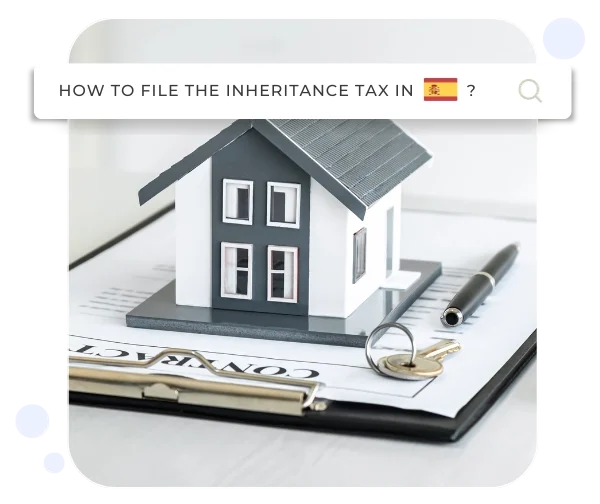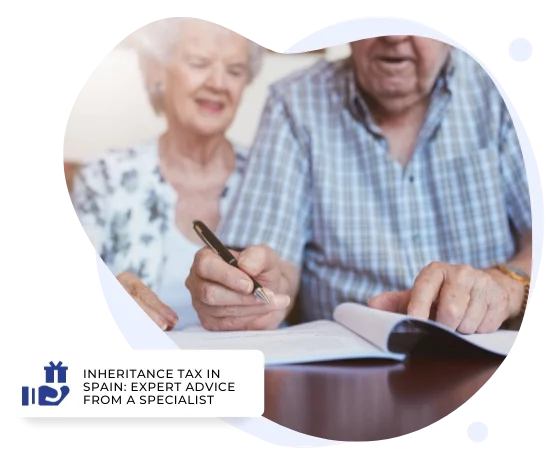Entre Trámites » Our Services » Inheritance Tax in Spain
Spain Inheritance Tax - Expert Assistance
Understanding Spanish Inheritance Tax Laws

inheritance and gift tax in spain
(Impuesto sobre Sucesiones y Donaciones)
Inheritance and Gift Tax in Spain is a tax levied on the transfer of assets and property, either by inheritance or donation. This tax varies according to the autonomous community and can result in a significant tax burden for heirs and donees.
This tax in Spain applies to heirs and beneficiaries of gifts, but the amount to be paid and the specific tax rules vary depending on the Autonomous Community you are in. Also, the relationship between the donor/deceased and the beneficiary has a direct impact on the amount of taxes to be paid. Below are some examples of typical rates:
- Spouses and Direct Descendants (children, grandchildren): Generally enjoy lower tax rates. For example, the rate can be from 1% to 10%, depending on the Autonomous Community.
- More Distant or Non-Related Relatives: In these situations, the rates are usually higher. For example, the rate can vary from 15% to 40% or more.


Taxed Assets:
- Real estate: This includes properties, land, and homes.
- Bank accounts and deposits: The balance of bank accounts and time deposits is subject to taxation.
- Securities and shares: Ownership of stocks, bonds, and other securities may generate tax obligations.
- Vehicles: Automobiles and other vehicles may also be subject to the tax.
- Jewelry and artworks: Valuable items such as jewelry and artworks are included in the taxable base.
Exemptions and Deductions:
- Exemption for Primary Residence: The specific value up to which it's exempt can vary significantly based on the Autonomous Community in Spain where you reside or where the property is located.
- Substantial Exemptions for Spouses and Direct Descendants: As mentioned previously, they are typically granted substantial tax exemptions, making these transfers more tax-efficient.
- Deductions for Donations to Registered Charitable Organizations: When you make a charitable gift, you can claim a deduction on your inheritance and gift tax liability. The exact deduction rules can differ from one Autonomous Community to another, and they often depend on the type of organization and the nature of the donation.
Schedule a Consultation with a Tax Expert
Complementary Services
That can be useful for you
Here's What People Say About Us
What are the Steps to File the Spanish Inheritance Tax?
Filing the Inheritance and Gift Tax in Spain involves several detailed steps, and it's crucial to complete the process accurately and on time to avoid penalties.
Gather All Relevant Documents
- Death certificate (in the case of an inheritance).
- Proof of your relationship to the deceased or donor.
- Valuation of the inherited or gifted assets, such as real estate, bank accounts, investments, and personal property.
- Any supporting documents for deductions, exemptions, or credits you intend to claim.
Complete the Modelo 650
It is standard document for declaring and self-assessing the Inheritance and Gift Tax. Provide the personal details of the donor/deceased and the beneficiaries, a detailed list of the inherited or gifted assets and information about any applicable deductions or credits you plan to claim.
Pay the tax
Once you've calculated your tax liability, make the necessary payment according to the tax rates and rules established by your Autonomous Community. You can usually do this by submitting the payment alongside the completed Modelo 650. Payment can be made through a bank transfer.
Submit the Modelo 650 and Receive the Tax Assessment
Once you submit it along with all the required supporting documentation and your return has been processed, you will receive a tax assessment from the Agencia Tributaria. It will detail your final tax liability, including any applicable deductions, exemptions, or credits. If the tax assessment confirms that your tax return is accurate and you have paid the correct amount, the process is complete.
Schedule Your Inheritance Tax Consultation Today!
Confused about Spain's Inheritance and Gift Tax? Our expert is here to help. Book a consultation now to understand your tax obligations and minimize your tax liability.
